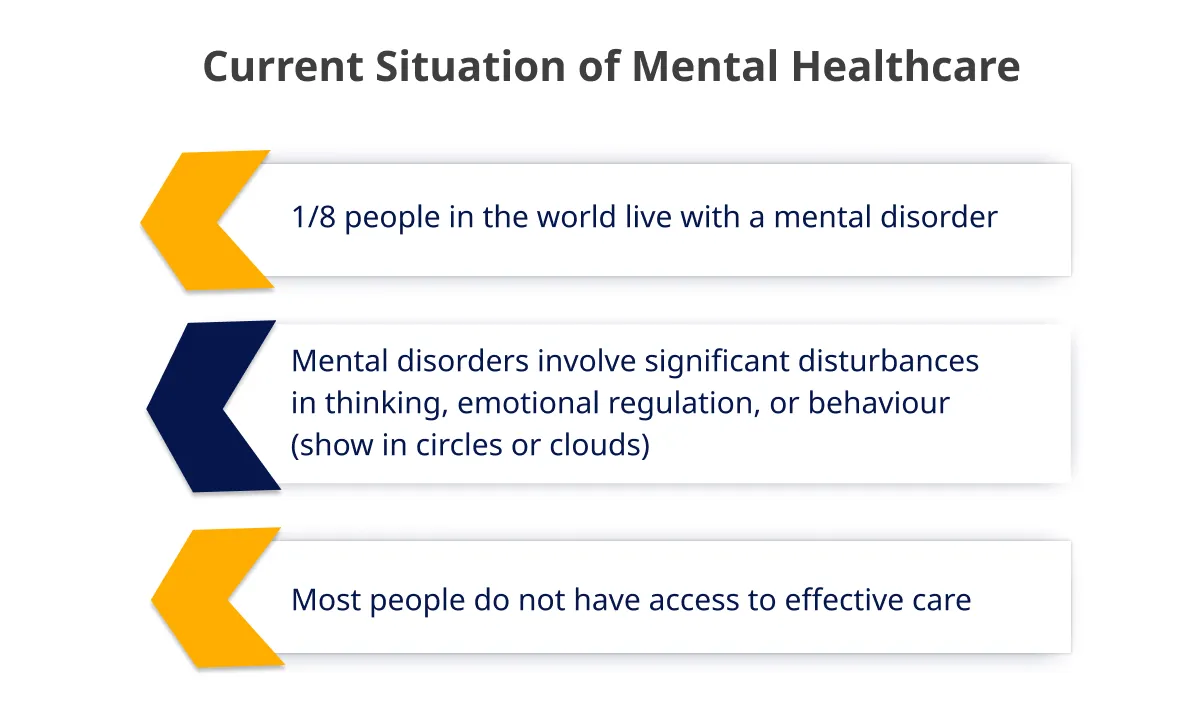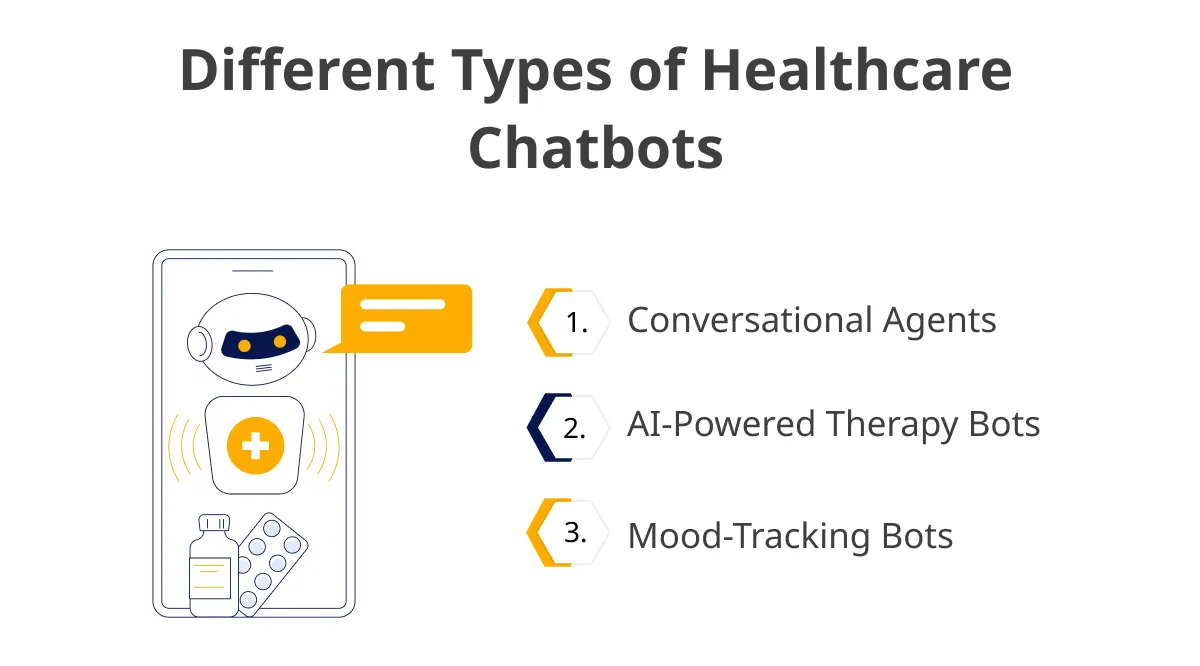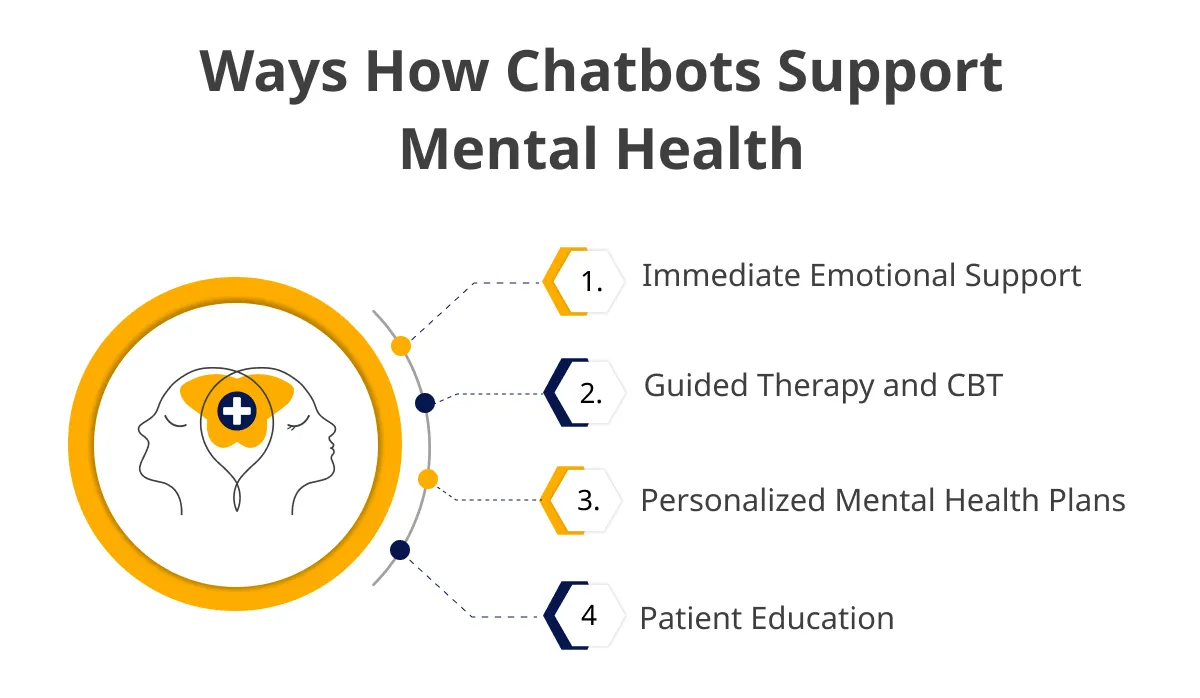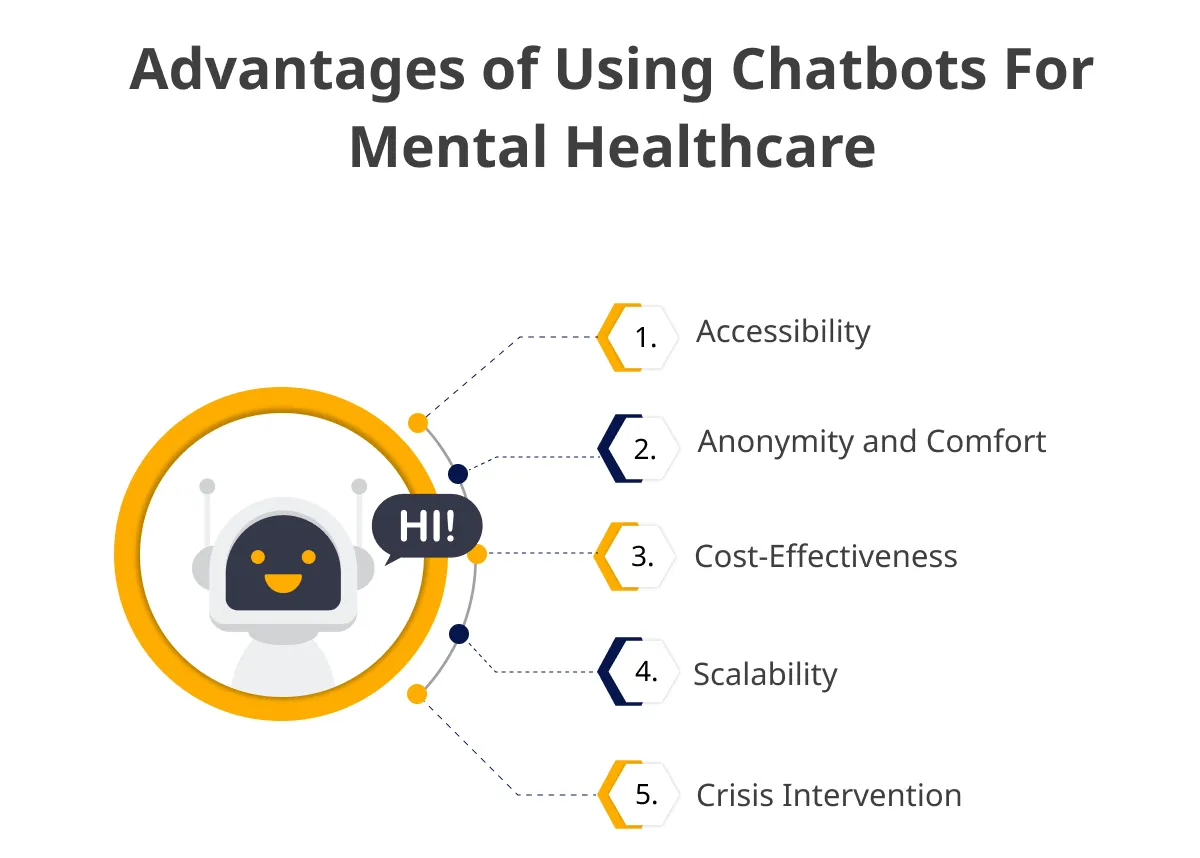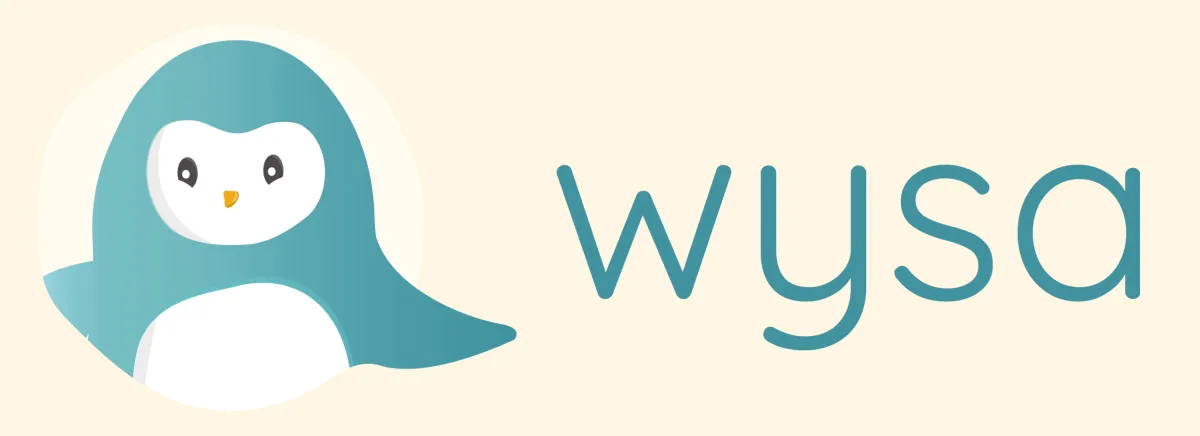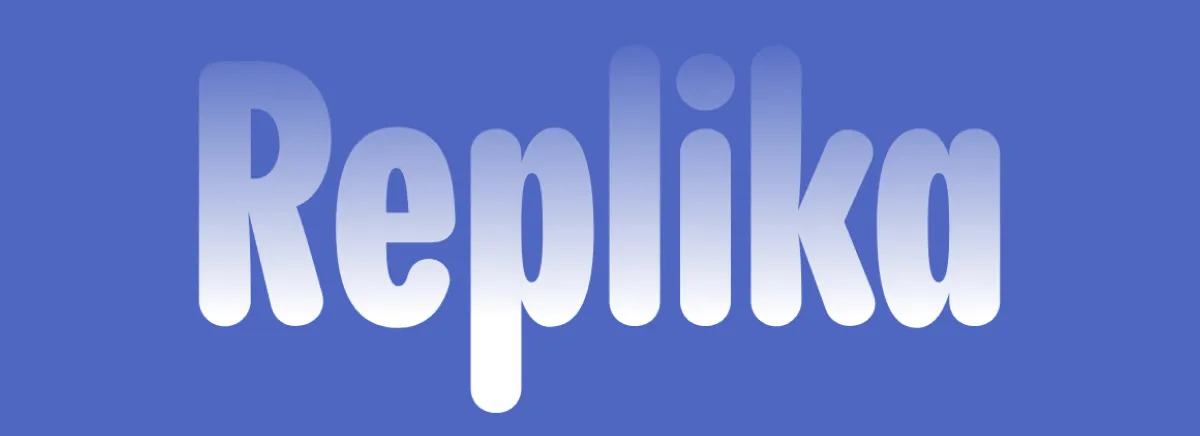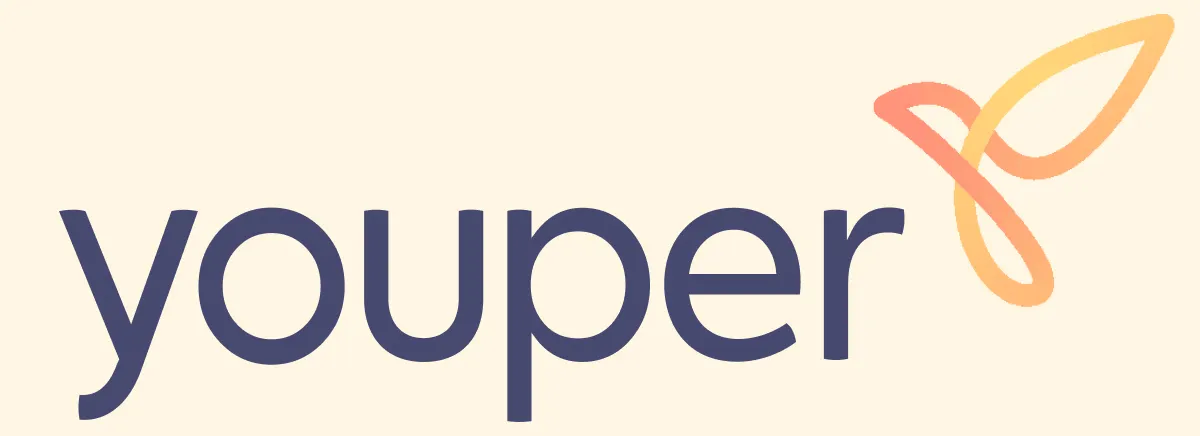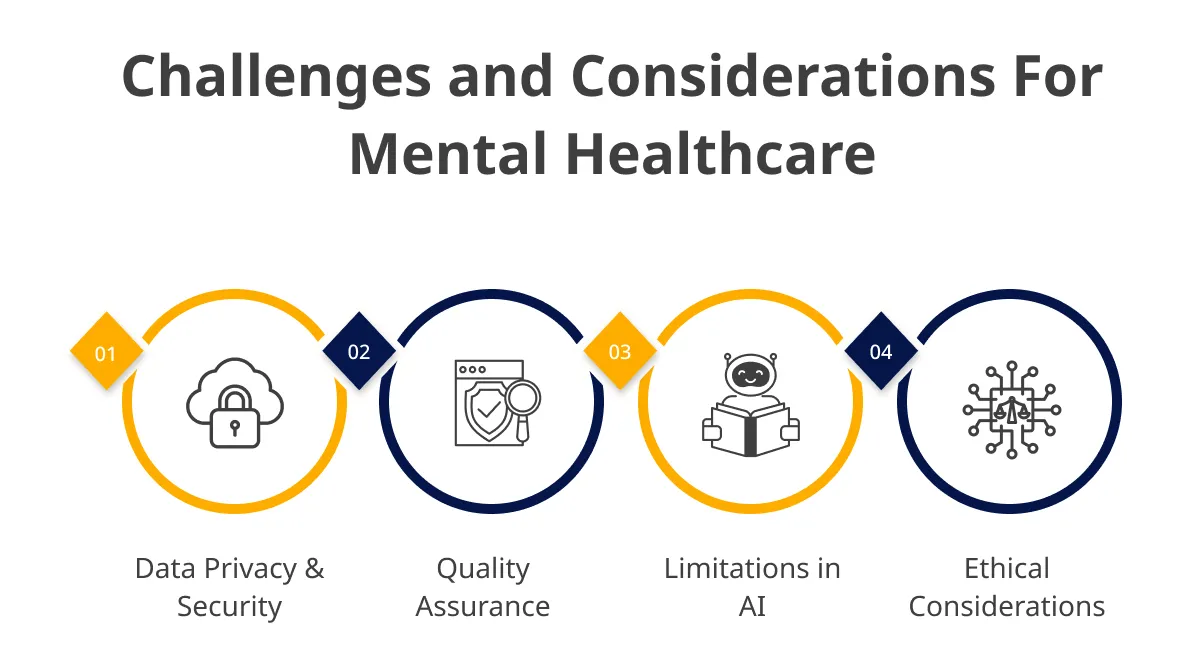One in every eight adults experiences a mental health issue.
While the statistics are alarming, this could be an opportunity for healthcare organizations to bring a positive change in society. Artificial Intelligence can play a key role in making this happen.
Imagine being unable to book a therapist appointment, but there’s an AI-powered chatbot to make you feel better. It will be convenient for patients to get immediate, accessible, and affordable support.
This is actually happening in the world of healthcare. AI Chatbots in mental healthcare are now at the forefront of providing emotional support, guidance, and therapeutic interventions.
The blog post talks about how chatbots are reshaping mental healthcare by enhancing accessibility, offering personalized support, and working alongside human professionals to create a more responsive and inclusive system for those in need.
Current State of Mental Healthcare Worldwide
According to the World Health Organization, nearly 1 billion people worldwide are dealing with some kind of mental disorder, yet the majority do not receive the care they need.
Stigma, limited resources, and a shortage of mental health professionals are significant barriers to access.
In many parts of the world, mental health and generative AI services are underfunded, and in low-income countries, access is even more limited, with fewer than one mental health worker per 100,000 people.
This critical shortage leaves millions without the required support, worsening conditions, and a heavier burden on strained healthcare systems.
Where there is stress, there must be a ray of hope…
Yes, it is “Chatbots in Mental Healthcare.”
Approximately 70% of users report finding mental health chatbots helpful in managing stress and anxiety.
In areas with limited access to mental health professionals, chatbots have been shown to reduce symptoms of depression by up to 34%.
As of 2024, millions of individuals globally regularly use AI-driven mental health chatbots, underscoring their growing influence and effectiveness in mental healthcare.
According to Grand View Research, the global market for mental health AI chatbots for mental health is expected to grow at a CAGR of 24.10% from 2024 to 2030, reflecting the increasing reliance on digital mental health tools.
We design AI chatbots to offer 24/7 patient assistance, anytime, anywhere.
Adoption of Chatbots In Mental Healthcare
Over the past decade, the development and adoption of mental health chatbots have grown significantly. Several ChatGPT solutions in healthcare are used today.
Initially, these tools were simple text-based programs designed to mimic human conversation. Still, advancements in AI and machine learning have led to the creation of sophisticated chatbots capable of providing meaningful mental health support.
The rise of digital mental health solutions is primarily driven by the increasing demand for accessible, affordable, and timely mental health services, particularly in regions where access to traditional therapy is limited.
Types of Mental Health Chatbots
Have a look at the different types and feature of Chatbots in mental healthcare and how chatbots transforming mental health:
- Conversational Agents: These chatbots engage users in real-time conversations, providing emotional support, coping strategies, and mental health resources.
- AI-Powered Therapy Bots: These bots simulate cognitive-behavioral therapy (CBT) techniques, guiding users through structured programs to manage anxiety, depression, and other mental health issues.
- Mood-Tracking Bots: Some chatbots track users’ moods over time, offering insights and personalized advice based on data trends to help users better understand and manage their mental health.
Also read: A Complete Guide For Healthcare App Development
How Chatbots Provide Mental Health Support?
Let’s look at how chatbots provide mental health support to patients and improve the personalized care scenario.
1. Immediate Emotional Support
Chatbots in mental healthcare offer real-time support during moments of crisis by providing users with immediate responses.
For example, suppose someone is experiencing anxiety or a panic attack. In that case, a chatbot can guide them through calming exercises and breathing techniques or connect them to a human counselor if necessary.
2. Guided Therapy and CBT
Many mental health chatbots are designed to incorporate Cognitive Behavioral Therapy (CBT) techniques, which are widely recognized for their effectiveness in treating a range of mental health issues.
These chatbots help users identify negative thought patterns, reframe their thinking, and practice coping strategies. By guiding users through structured CBT exercises, chatbots empower individuals to manage their mental health proactively.
3. Personalized Mental Health Plans
Chatbots analyze user interactions and data to develop personalized mental health plans. By tracking user behavior and responses over time, these AI-driven tools can offer tailored advice and interventions that suit the individual’s unique needs.
This personalized approach ensures that users receive support specifically relevant to their situation, enhancing the effectiveness of the care provided.
4. Patient Education
In addition to providing support, chatbots also play a vital role in educating users about mental health conditions, treatment options, and self-care practices. They offer reliable information about symptoms, treatment modalities, and preventative measures.
This empowers users to make informed decisions about their mental health. Chatbots contribute to a more informed and proactive approach to mental wellness by increasing awareness and understanding.
Reduce strain on your healthcare team and offer personalized support with AI chatbots.
Benefits of Chatbots in Mental Healthcare
In addition to providing accessible and cost-effective care, there are more benefits of using chatbots for mental healthcare.
1. Accessibility
One of the most significant benefits of mental health chatbots is their 24/7 availability. Chatbots in mental healthcare offer support whenever it is needed, regardless of time or location.
This continuous access breaks down geographical barriers, ensuring that people in remote or underserved areas can receive mental health support.
Additionally, chatbots offer a more affordable alternative to traditional therapy, making mental healthcare more accessible to those who may not have the financial resources for regular therapy sessions.
2. Anonymity and Comfort
Chatbots provide a unique space where individuals can express their thoughts and feelings without fearing judgment or stigma.
The anonymity offered by chatbots encourages people to open up about their mental health struggles, which they might hesitate to do in face-to-face interactions.
This sense of comfort can lead to more honest conversations, which is crucial for adequate mental health support.
3. Cost-Effectiveness
Chatbots significantly reduce the costs associated with mental healthcare IT consulting for providers and patients.
From the provider’s perspective, chatbots can handle many interactions without a proportional staff increase.
For patients, the use of chatbots often eliminates the need for expensive therapy sessions, providing a more budget-friendly option for mental health care.
Related Blog: ChatGPT: Top 10 Use Cases In Software Development
4. Scalability
Chatbots are inherently scalable, meaning they can serve many users simultaneously. Unlike human therapists, who are limited by time and capacity, chatbots can engage with thousands of users simultaneously, providing consistent and reliable support.
This scalability is essential in times of crisis or when mental health resources are stretched thin.
5. Crisis Intervention
Chatbots are increasingly being designed with features that allow them to identify signs of severe mental distress, including suicidal ideation.
Through the analysis of user interactions, chatbots can detect warning signs and respond by providing crisis resources or escalating the situation to human professionals when necessary.
This capability makes them a valuable tool in early intervention and in potentially saving lives during mental health emergencies.
We build AI chatbots to help you reach more patients without overloading your staff.
Real-World Examples of Chatbots in Mental Healthcare
Here, you will find real-world AI use cases of how different mental health chatbots are making a tangible impact on custom healthcare software development.
1. Woebot Health
Woebot Health is a pioneering mental health chatbot designed to offer users cognitive-behavioral therapy (CBT) techniques through conversational AI.
Launched by an AI development company in 2017, Woebot has since provided real-time support to users experiencing anxiety, depression, and other mental health challenges.
Its impact lies in its ability to provide immediate, evidence-based interventions, making mental health support more accessible and reducing the stigma associated with seeking help.
2. Wysa
Wysa is an AI-driven emotional support chatbot that engages users in empathetic conversations to help them manage stress, anxiety, and other mental health concerns.
By combining AI with therapeutic techniques, Wysa offers personalized coping strategies and mood tracking features. Its role in mental healthcare has been particularly significant for users who prefer anonymity and immediate support, offering a safe space for emotional expression.
3. Replika
Replika is a unique mental health chatbot that allows users to create supportive AI companions. Unlike traditional therapy bots, Replika focuses on building long-term relationships with users and adapting conversations based on individual personalities and preferences.
This personalized approach helps users feel understood and supported, promoting mental wellness through companionship and ongoing interaction.
4. Tess
Tess is a mental healthcare chatbot designed to offer real-time emotional support through text messaging. Tess engages users in natural language conversations, providing evidence-based responses that help manage stress, anxiety, and depression.
Its flexibility in delivering support via text has made Tess particularly effective in reaching diverse populations, including those who may not have access to traditional mental health services.
5. Youper
Youper is an AI-powered chatbot that utilizes cognitive-behavioral therapy (CBT) techniques to assist users in monitoring and managing their mental health.
Youper’s data-driven approach guides users through short, daily conversations that help identify emotional patterns and provide actionable insights.
By integrating CBT principles with AI, Youper empowers users to take control of their mental health, offering practical tools for emotional regulation and self-reflection.
Also read: AI-Powered Future: Revolutionizing Businesses With Tools Like ChatGPT
Challenges and Ethical Considerations
Chatbots in mental healthcare come with some challenges that need to be rectified when the issues occur:
Data Privacy & Security: If you handle sensitive mental health information with AI chatbots, this raises significant privacy concerns. Hence, you must ensure that all interactions are encrypted and stored securely and comply with regulations like GDPR and HIPAA.
Limitations in AI: While chatbots can be highly impactful in providing support, they still need to understand the full complexity of human emotions. This further leads to misunderstandings/ insufficient responses in complex situations.
How can you combat these issues…
Ethical Considerations: The increased usage of AI in mental healthcare brings ethical dilemmas, including the risk of over-reliance on chatbots for serious mental health issues. This may further require human intervention. So, you must balance AI with traditional therapy.
Quality Assurance: It is vital to ensure that chatbot interactions meet clinical standards. The information provided by chatbots should be accurate and beneficial, with regular updates and oversight by mental health professionals to maintain high quality.
Use chatbot technology for 24/7 mental health support. we can help you build it.
The Future of Chatbots in Mental Healthcare
As a business owner, you must have a forward-looking perspective for the chatbots in mental healthcare. These chatbots’ future includes potential advancements, integration with traditional care, and a long-term impact on the industry.
Advancements in AI
As AI/ML continues to evolve, the capabilities of mental health chatbots are expected to become more sophisticated.
Future chatbots would offer more personalized and accurate support by using advanced natural language processing to understand complex human emotions and mental states.
AI for mental health support could lead to chatbots that respond to users and anticipate their needs, providing proactive mental wellness with AI in healthcare.
Integration with Traditional Mental Healthcare
The future of chatbots in mental healthcare is likely to involve closer integration with traditional therapy and counseling services.
Chatbots could serve as a bridge between sessions, offering ongoing support and monitoring to ensure patients stay on track with their mental health goals.
This hybrid model, where chatbots work alongside human therapists, could enhance the overall effectiveness of treatment plans, making mental healthcare more accessible and continuous.
Long-Term Impact
The widespread adoption of chatbots in mental healthcare sector could have significant long-term effects on how mental healthcare is delivered.
By reducing barriers to access, such as cost and stigma, chatbots could democratize mental health support, making it available to a broader audience.
Over time, this could shift how society views and addresses mental health, with technology playing a central role in maintaining mental well-being.
Also read: Building An AI Chatbot? Check Out The Types, Tech Stacks, And Steps
Conclusion
As you navigate the complexities of mental health in this digital age, chatbots are emerging as powerful tools. They offer a blend of accessibility, anonymity, and personalized care that traditional methods often struggle to match.
While they are not a replacement for human therapists, these AI-driven tools provide valuable support and intervention, especially in moments of need. Moreover, the ongoing evolution of chatbot technology promises even more significant innovations.
At ValueCoders, we are helping healthcare organizations use AI to improve the quality of care. You can hire AI engineers to build Chatbots for mental well-being of patients or provide accessible healthcare services at lower prices.
Get in touch with our experts to find out how you can collaborate with our AI service company and build advance solutions for your organization.


